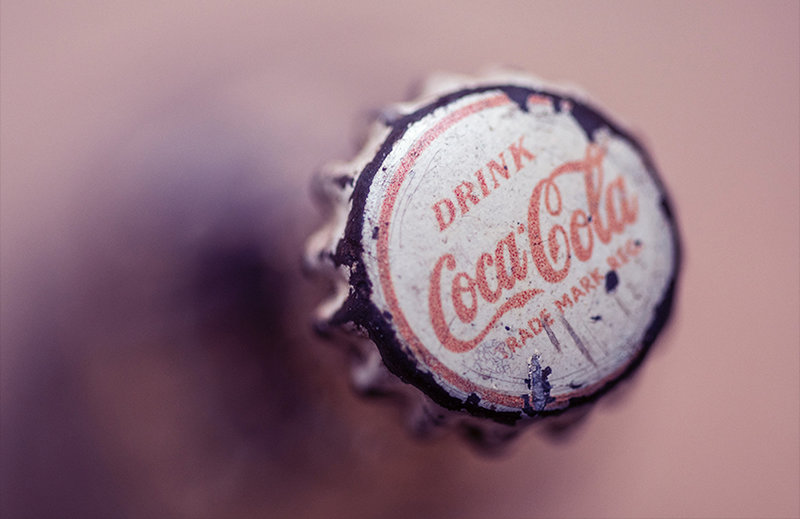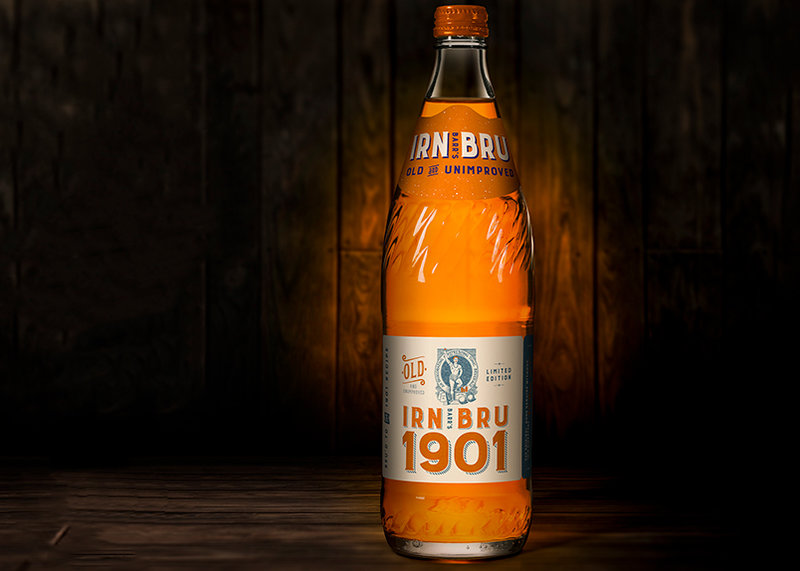Towards the end of 2019, AG Barr announced the release of Irn Bru 1901, a limited-edition consumer soft drink with an added-sugar recipe that launched in 75cl glass bottles in Scotland.
The variant contains 10.6g of sugar per 10cl – slightly more than the core Irn Bru SKU contained before the UK's Soft Drinks Industry Levy (SDIL) sparked a reduction.
The original recipe sugar content dropped from 10.3g to 4.7g per 10cl due to the SDIL, just under the threshold for the levy.
In the launch materials, AG Barr describes the new 1901 as a "premium" limited release. "We've gone back to the 1901 recipe and are using the same amount of sugar to make it as authentic as possible," a spokesperson told just-drinks.
News of the launch of 1901 was shared thousands of times on social media channels – from Scottish newspapers holding taste tests to local shops taking pre-orders, there was an excited market.
The traction was no doubt a welcome antidote to late-2017's online backlash over the old iteration's sugar reduction.
The launch of 1901 also follows a difficult half-year for AG Barr. Results for the first six months of 2019 saw sales drop 10% to £122.5m while profits-before-tax tumbled by 26% to £13.5m.
The company flagged the struggles in a profit warning, issued in July 2019, blaming (among other things) changing pricing and promotional dynamics, following the introduction of the SDIL.
Classic example
With the benefit of hindsight, perhaps AG Barr should've taken a leaf out of The Coca-Cola Company's book: despite sugar taxes popping up all over the world, the group has, to my knowledge, never talked about changing the core classic red Coke recipe.
Instead, the language used around classic Coke has framed the drink as an indulgence. The company also appeals to the more health-conscious consumer with smaller pack sizes.
Coca-Cola Co's 2019 Investor Overview, published in July 2019, highlights the advantages of a 7.5oz mini-can over the traditional 12oz can in the US market.
The consumer proposition, the company says, includes "only 90 calories, 38% less sugar, permissibility 'back into the home', [and is a] refreshing 'treat' (less liquid)".

Image: Shaun-bell
Like Irn Bru 1901, Coke is showing signs of a premium proposition out of the mainstream limelight that, arguably, Coke Zero Sugar is destined to fill.
As for mentions of classic Coke in the group's post-results conference calls – they are thin on the ground. In Coca-Cola European Partners' Q2 and Q3 2019 calls, talk focused on innovation across an increasingly-diversified portfolio.
When it comes to the namesake trademark, growth is driven by Coke Zero Sugar and innovation has largely centred on Diet Coke/Coke Light flavours and the introduction of the company's Coke Energy offer.
Iconic flavour
But that's not to say that classic Coke's iconic flavour profile is being side-lined. Indeed, Coke Zero Sugar was relaunched with a taste profile even closer to classic Coke.
In the Q3 2019 earnings call, Coca-Cola Co CEO James Quincey said that Coke Energy's flavour would move closer to that of classic Coke in the US market.
"I think [in] the US marketplace, in order to really drive towards a strategy that brings new consumers into the energy category, we're moving the flavour profile closer to Coke," Quincey told analysts.
"We'll save some of the bells and whistles of the plans for a later date ... that's a very clear approach in the US to drive additional growth for the energy category by taking the product closer in flavour to Coca-Cola Classic."
If you have been to Scotland, you will know that Irn Bru also enjoys iconic status.
The brand is a source of national pride and although some of the sugar reduction-sparked social media backlash was in jest, there were also a lot of disgruntled consumers.
Expectations for 1901 – from both AG Barr and Irn Bru fans, are no doubt, high.

Irn Bru 1901. Image: AG Barr
As sugar levies are introduced in more markets – Italy looks like it will be next – perhaps local players will consider the Irn Bru and classic Coke examples.
Instead of axeing sugar across the board, maybe moving the full-sugar offer into a premium or niche position could prove more successful.
Of course, describing classic Coke right now as being 'niche' seems silly. But, we only need to look at the company's increasingly diverse portfolio to see that the Coca-Cola system is spreading its eggs across many baskets.
Many have pondered how consumer soft drinks could fill the 'premium' gap in the wider soft drinks category. Irn Bru's 1901 could be the answer.